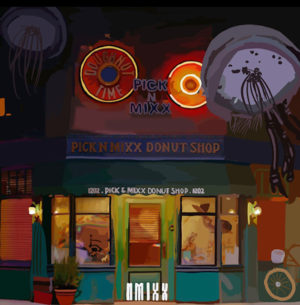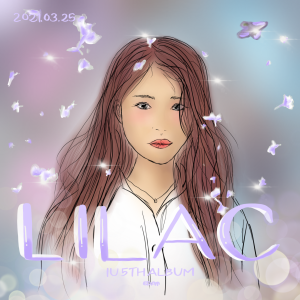Dreamcatcher’s new album showcases their versatility
Dreamcatcher effectively weaves multiple genres in their most recent album while highlighting each member’s talents.
April 28, 2022
Released on April 12, Korean girl group Dreamcatcher’s new album, “Apocalypse: Save Us” effectively weaves multiple genres together with intense instrumentals. By continuing their exploration of rock music with splashes of synth-pop and haunting ballads, the girl group continues to set themselves apart from other K-pop acts.
Dreamcatcher encapsulates the entire album with its introduction, even down to the track’s name: “Intro: Save Us.” Piercing strings and organ music give a haunting effect, as if disaster is to strike at any moment. But at the climax, the song switches into the girl group’s signature rock sound with heavy electric guitar and drums. Although their theme of an apocalypse sometimes faded throughout the album, their ability to pull off various styles of music was very clearly highlighted.
In fact immediately afterwards, Dreamcatcher tackles jazz, a genre that is rarely attempted by other K-pop groups, with “Locked Inside a Door.” With similarities to their past track “Jazz Bar,” the song uses stripped-back instrumentations to let the members’ voices take center stage. Even though the song sounds energetic, the lyrics tell a different story of being trapped with worries and lacking energy and emotions.
While “Locked Inside a Door” serves as an effective lead to the rest of the album, “MAISON” is Dreamcatcher at their best. Right off the bat, a tight guitar riff sets the stage for the musical landscape, reeling viewers into the song. With constant booming percussion in the background, Dreamcatcher’s vocals are on full display, especially during the bridge. With a shift to a slower tempo, orchestral piano chords accentuate lead vocalist JiU and main vocalist Siyeon’s voices as they recollect a time of clarity and beauty.
The lyrics live up to the album’s name, speaking about an apocalyptic predicament that plagues the human race: global warming. “Maison” is the French translation of the word “home,” and Dreamcatcher cries out to “save [our] home in the jungle.” Their urgency is sonorously conveyed by their words and a theatrical final chorus, which pairs gargantuan drums, an operatic choral group, and the girl group’s final pleas.
“Starlight” is “MAISON”’s antithesis in almost every aspect. A piercing message and bombastic production are traded for a retro electro-pop song, one that feels reminiscent of fellow K-pop girl group Cherry Bullet’s song “Love So Sweet.” Instead of foreshadowed destruction, “Starlight”’s lyrics focus on the golden memories of the past, reflecting the sweet moments Dreamcatcher has shared as a group since their debut. “Starlight” succeeds as a synthwave masterpiece, with pulsating synth progressions and a momentous pre-chorus.
“Together” is the less memorable electro-pop track on the album, yet still possesses a chic sound. “Together” sounds more celestial than “Starlight,” with its splashes of synths but overall has a very similar theme to the previous track.
To conclude the first half of the album, Dreamcatcher sings a heartfelt ballad — “Always” — with gut-punching emotion and conviction. An ode to their tumultuous journey as a K-pop group, the song comforts fans, promising that the members will always be together.
We transition into the distinct second half with “Skit: The Seven Doors.” Despite it being an interlude instead of a funny skit, the brief intermission prepares us for the solos of all seven members of Dreamcatcher. Each member participated in the writing and production of their solos, adding their personal touch and flare to the album.
The solos showcase the group’s versatility, as almost every song has a completely different style and genre from the other. For example, “Cherry (Take Miracle)” has a groovy tone that highlights lead vocalist JiU’s vocal prowess. The song combines the funk of TXT’s “Blue Hour” with the nostalgia of Gfriend’s “Me Gustas Tu,” and serves as a refreshing introduction to spring.
On the other hand, the next song, “No Dot,” is a 180 turn from the last song. Instead of being warm and comforting, “No Dot” is fierce with its bombastic trap beats and the powerful rap and vocal abilities of main dancer SuA. The booming hip-hop beats are reminiscent of many boy group songs, but are often uncommon in girl groups. SuA pulls off this difficult concept with her sharp charisma and talents.
Siyeon’s “Entrancing” and Handong’s “Winter”’ make up a slower-tempo couplet with an angelic vibe. “Entrancing” really lives up to the song’s title; Siyeon’s voice is fairy-like and ethereal, contrasting from her typically powerful tone. The floating piano notes and larger-than-life orchestral production reminds the listener of a fantasy movie. The lyrics mimic the title track, describing a world that has lost its color and is fading away. With winter being a season that also lacks color, “Winter” reminisces about a past relationship, one that is frozen in the midwinter. Handong’s rich vocal color, nestled in chill R&B beats, comforts listeners.
Yoohyeon’s “For” has a similarly slow pace but ventures into the jazz genre with energetic piano melodies. The song is sung almost entirely in English except for the phrase “안아 줘” (“hug me”) and showcases the lead vocalist’s angelic vocals. “For” also continues with the winter and fantasy theme, as it sounds very similar to a Christmas song with references to snow and fairy tales.
The most experimental and unique solo is main rapper Dami’s “Beauty Full.” Instead of focusing on her excellent rapping skills with a hip-hop track, her deep voice cuts deep into aggressive guitar riffs and booming drums with a homage to early 2000s pop punk. With rebellious lyrics that inspire one to live their life to the fullest, Dami shines the most.
The album ends with the maknae, the youngest member of the group, Gahyeon’s track “Playground.” Although the chorus is somewhat underwhelming, the song has a very cute vibe with energetic trumpets that suits Gahyeon’s aura well. This may not be the strongest song on the album, but it is the most catchy and saccharine.
Although the album lacks cohesiveness as it jumps from genre to genre, Dreamcatcher showcases their versatility and charisma with “Apocalypse: Save Us.” With a powerful title track and seven solos that highlight the talents and styles of each member, the album explores a variety of styles and concepts.






